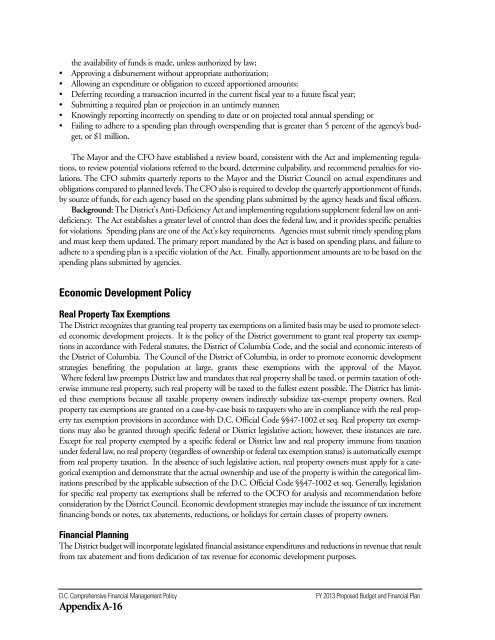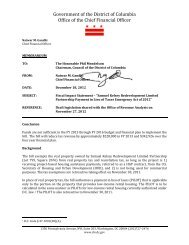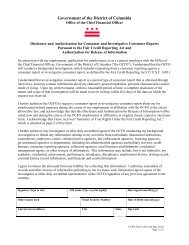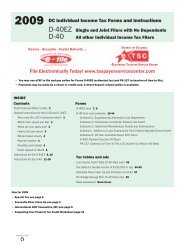Volume 1 - Executive Summary - Office of the Chief Financial Officer
Volume 1 - Executive Summary - Office of the Chief Financial Officer
Volume 1 - Executive Summary - Office of the Chief Financial Officer
Create successful ePaper yourself
Turn your PDF publications into a flip-book with our unique Google optimized e-Paper software.
<strong>the</strong> availability <strong>of</strong> funds is made, unless authorized by law;<br />
• Approving a disbursement without appropriate authorization;<br />
• Allowing an expenditure or obligation to exceed apportioned amounts;<br />
• Deferring recording a transaction incurred in <strong>the</strong> current fiscal year to a future fiscal year;<br />
• Submitting a required plan or projection in an untimely manner;<br />
• Knowingly reporting incorrectly on spending to date or on projected total annual spending; or<br />
• Failing to adhere to a spending plan through overspending that is greater than 5 percent <strong>of</strong> <strong>the</strong> agency’s budget,<br />
or $1 million.<br />
The Mayor and <strong>the</strong> CFO have established a review board, consistent with <strong>the</strong> Act and implementing regulations,<br />
to review potential violations referred to <strong>the</strong> board, determine culpability, and recommend penalties for violations.<br />
The CFO submits quarterly reports to <strong>the</strong> Mayor and <strong>the</strong> District Council on actual expenditures and<br />
obligations compared to planned levels. The CFO also is required to develop <strong>the</strong> quarterly apportionment <strong>of</strong> funds,<br />
by source <strong>of</strong> funds, for each agency based on <strong>the</strong> spending plans submitted by <strong>the</strong> agency heads and fiscal <strong>of</strong>ficers.<br />
Background: The District's Anti-Deficiency Act and implementing regulations supplement federal law on antideficiency.<br />
The Act establishes a greater level <strong>of</strong> control than does <strong>the</strong> federal law, and it provides specific penalties<br />
for violations. Spending plans are one <strong>of</strong> <strong>the</strong> Act's key requirements. Agencies must submit timely spending plans<br />
and must keep <strong>the</strong>m updated. The primary report mandated by <strong>the</strong> Act is based on spending plans, and failure to<br />
adhere to a spending plan is a specific violation <strong>of</strong> <strong>the</strong> Act. Finally, apportionment amounts are to be based on <strong>the</strong><br />
spending plans submitted by agencies.<br />
Economic Development Policy<br />
Real Property Tax Exemptions<br />
The District recognizes that granting real property tax exemptions on a limited basis may be used to promote selected<br />
economic development projects. It is <strong>the</strong> policy <strong>of</strong> <strong>the</strong> District government to grant real property tax exemptions<br />
in accordance with Federal statutes, <strong>the</strong> District <strong>of</strong> Columbia Code, and <strong>the</strong> social and economic interests <strong>of</strong><br />
<strong>the</strong> District <strong>of</strong> Columbia. The Council <strong>of</strong> <strong>the</strong> District <strong>of</strong> Columbia, in order to promote economic development<br />
strategies benefiting <strong>the</strong> population at large, grants <strong>the</strong>se exemptions with <strong>the</strong> approval <strong>of</strong> <strong>the</strong> Mayor.<br />
Where federal law preempts District law and mandates that real property shall be taxed, or permits taxation <strong>of</strong> o<strong>the</strong>rwise<br />
immune real property, such real property will be taxed to <strong>the</strong> fullest extent possible. The District has limited<br />
<strong>the</strong>se exemptions because all taxable property owners indirectly subsidize tax-exempt property owners. Real<br />
property tax exemptions are granted on a case-by-case basis to taxpayers who are in compliance with <strong>the</strong> real property<br />
tax exemption provisions in accordance with D.C. Official Code §§47-1002 et seq. Real property tax exemptions<br />
may also be granted through specific federal or District legislative action; however, <strong>the</strong>se instances are rare.<br />
Except for real property exempted by a specific federal or District law and real property immune from taxation<br />
under federal law, no real property (regardless <strong>of</strong> ownership or federal tax exemption status) is automatically exempt<br />
from real property taxation. In <strong>the</strong> absence <strong>of</strong> such legislative action, real property owners must apply for a categorical<br />
exemption and demonstrate that <strong>the</strong> actual ownership and use <strong>of</strong> <strong>the</strong> property is within <strong>the</strong> categorical limitations<br />
prescribed by <strong>the</strong> applicable subsection <strong>of</strong> <strong>the</strong> D.C. Official Code §§47-1002 et seq. Generally, legislation<br />
for specific real property tax exemptions shall be referred to <strong>the</strong> OCFO for analysis and recommendation before<br />
consideration by <strong>the</strong> District Council. Economic development strategies may include <strong>the</strong> issuance <strong>of</strong> tax increment<br />
financing bonds or notes, tax abatements, reductions, or holidays for certain classes <strong>of</strong> property owners.<br />
<strong>Financial</strong> Planning<br />
The District budget will incorporate legislated financial assistance expenditures and reductions in revenue that result<br />
from tax abatement and from dedication <strong>of</strong> tax revenue for economic development purposes.<br />
D.C. Comprehensive <strong>Financial</strong> Management Policy<br />
Appendix A-16<br />
FY 2013 Proposed Budget and <strong>Financial</strong> Plan
















